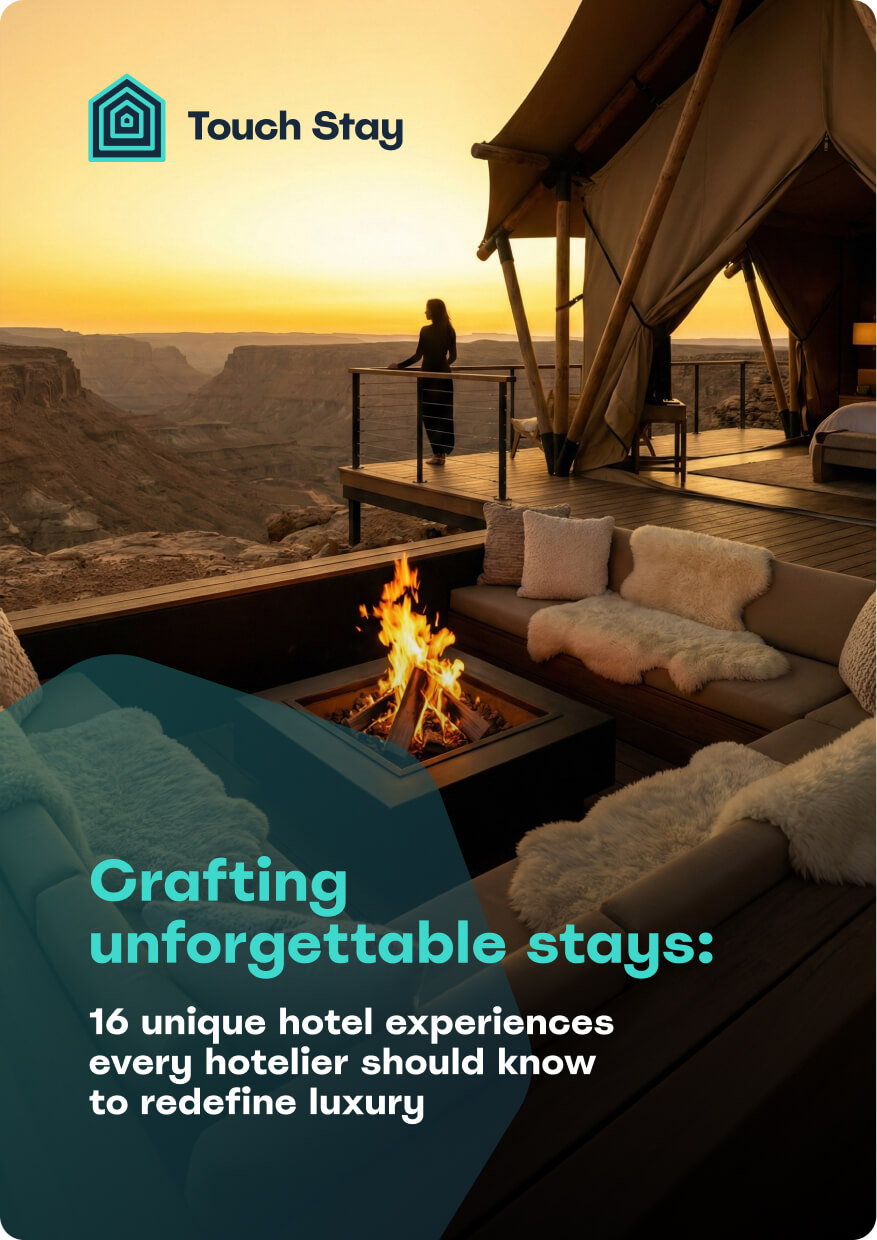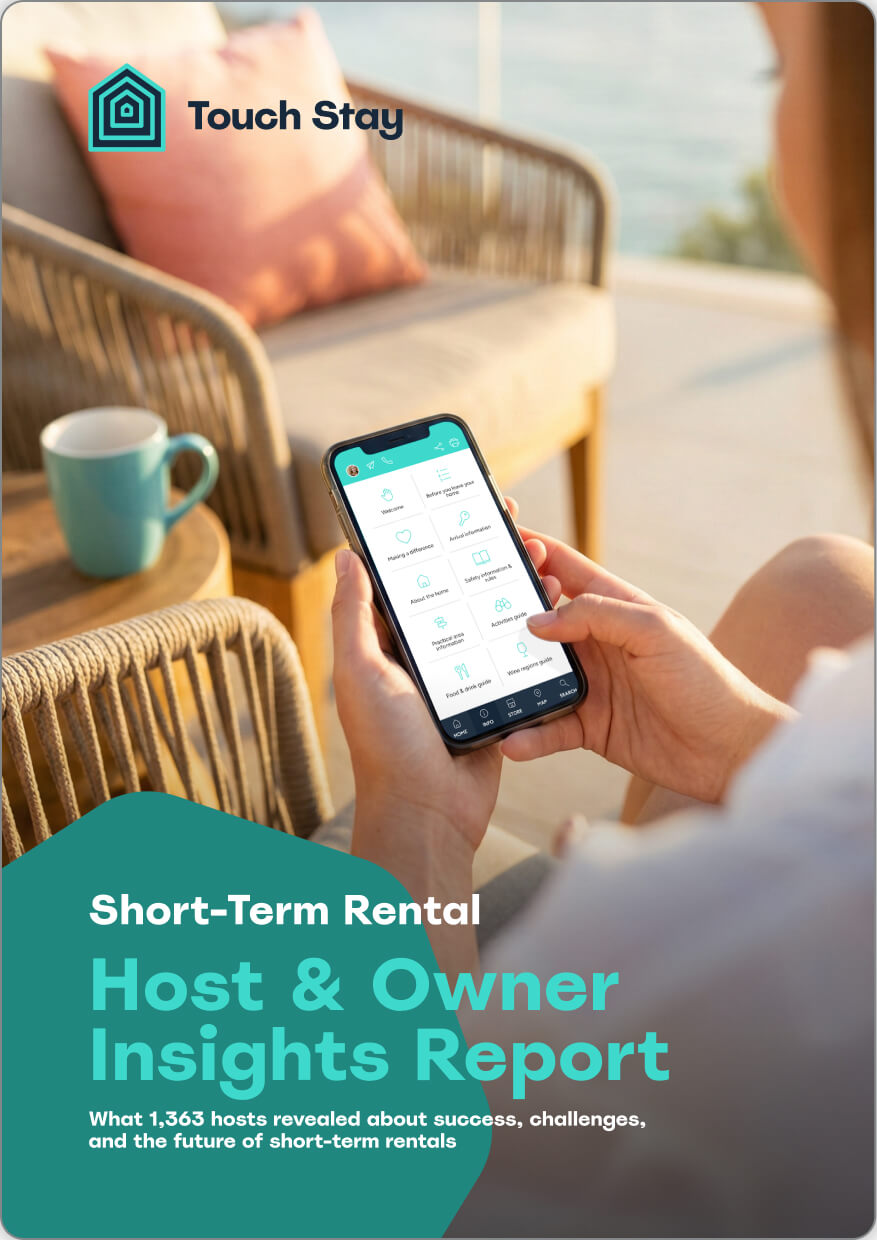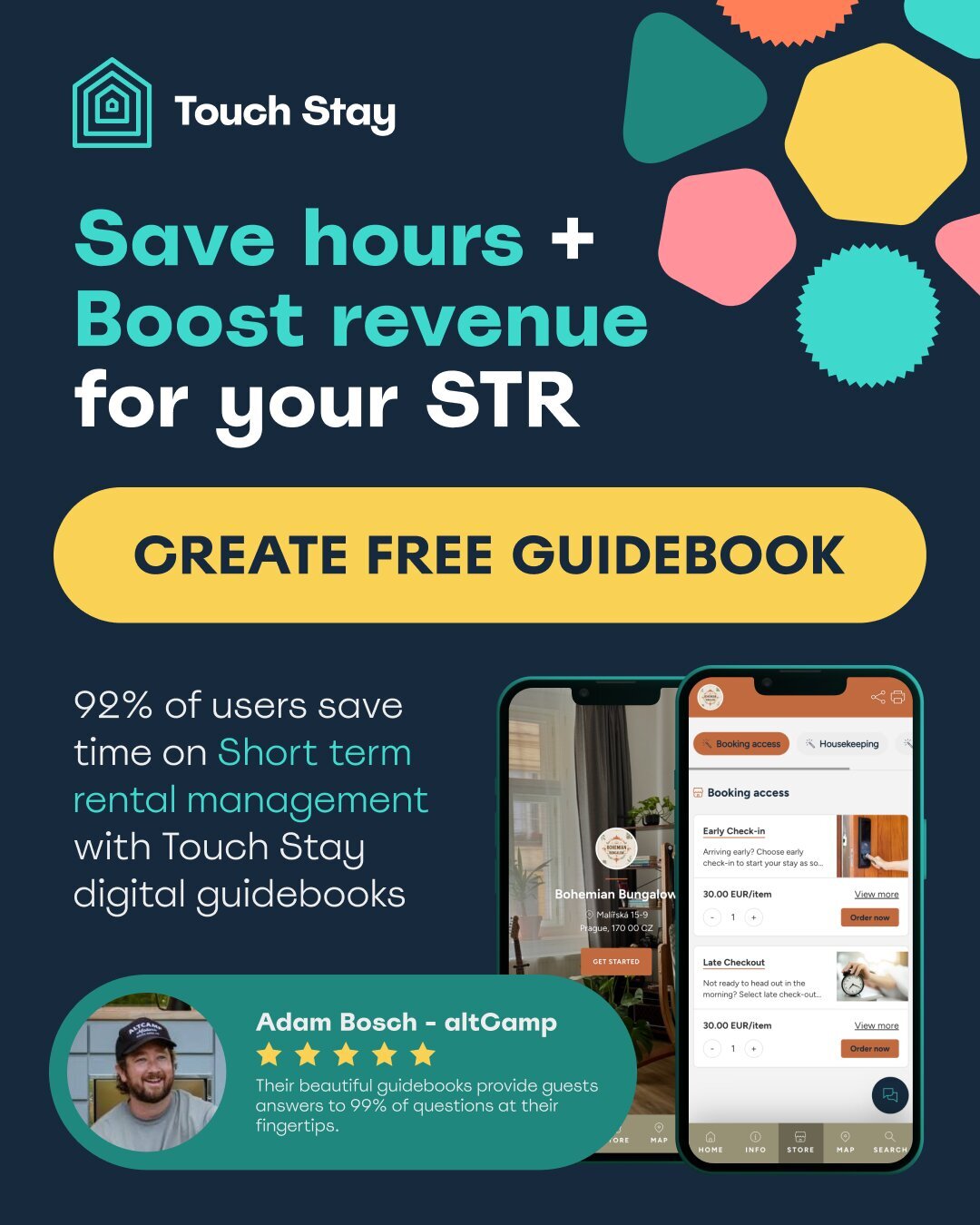As an Airbnb host or short-term rental (STR) investor, understanding the legal landscape in each state is critical to your success. Airbnb regulations, laws, and requirements can vary significantly depending on where you operate.
This guide provides detailed insights into the key short-term rental regulations across 12 promising U.S. states, including information on licensing, local restrictions, and best practices to remain compliant. Our goal is to help you navigate the complexities of STR laws, allowing you to expand your vacation rental portfolio with confidence.
Want to stay ahead of the curve? Try a digital guidebook and join the 92% of Touch Stay users who have halved the time they spend managing guests.
Simply drop in your Airbnb link.
Get your custom guest guide in 60 seconds. No card required.
This guide to Airbnb regulations will cover:
- An overview of short-term rental laws
- A state-by-state guide to Airbnb short-term rental laws
- Navigating the regulatory landscape for hosts and investors
- Protecting your investment
- Future trends in short-term rental regulations
- FAQs
An overview of short-term rental laws
Short-term rental regulations exist to protect property owners, guests, and local communities. They often cover areas like licensing, zoning, occupancy limits, taxes, and safety standards. While some states have statewide regulations, many leave it to individual cities or counties to set their own rules.
Why compliance is essential for Airbnb hosts
Failing to follow Airbnb regulations could result in fines, lawsuits, or even a ban on your property being listed. Additionally, complying with STR laws fosters good relationships with local communities and helps maintain the long-term sustainability of your business. Non-compliance can also lead to negative reviews from guests, decreased bookings, and in worst-case scenarios, having your listing removed from platforms like Airbnb.
As a host, understanding the nuances of short-term rental laws in your area protects both your investment and your reputation. It ensures you’re contributing positively to the local economy while avoiding legal complications.
1. Florida

Florida is a popular destination for tourists, and the state generally supports short-term rentals. However, local governments can impose their own regulations, making it essential for Airbnb hosts to stay informed about both state and city-level laws.
- State licence: Airbnb hosts in Florida must obtain a licence from the Department of Business and Professional Regulation (DBPR).
- Taxes: hosts are required to register with the Florida Department of Revenue for tax purposes and must collect both state and local tourist development taxes.
- Local regulations: cities like Miami Beach have enacted strict local laws to regulate STRs. Always check your local jurisdiction for specific requirements.
2. California

California is known for its city-specific Airbnb regulations, with municipalities like San Francisco and Los Angeles leading the charge in STR legislation. The state allows local authorities to control the rules.
- Business Licence: most cities in California, including Los Angeles, require hosts to have a business licence to operate legally.
- Registration: hosts must register with local authorities, with some cities imposing strict caps on the number of nights a property can be rented.
- Local regulations: San Francisco, for instance, limits short-term rentals to hosts who occupy the property as their primary residence, and Los Angeles has implemented a home-sharing ordinance that affects many hosts.
3. Texas

Texas does not have a statewide STR regulation, leaving local municipalities in control. This results in a patchwork of rules that vary significantly depending on the city.
- Local permits: some cities like Austin require hosts to obtain permits for STRs, with strict regulations on licensing and occupancy limits.
- Taxes: hosts must collect and remit state hotel occupancy taxes. Some cities and counties may impose additional local taxes.
- Local regulations: Austin’s STR rules are particularly stringent, including limits on the number of occupants and enforcement of noise restrictions.
4. New York

New York, particularly New York City, has some of the toughest Airbnb laws in the U.S. Due to concerns about housing shortages, the state enforces strict regulations on short-term rentals.
- Multiple dwelling law: in NYC, rentals of fewer than 30 days are prohibited in most apartment buildings unless the host is present during the stay.
- Local regulations: NYC mandates that Airbnb and similar platforms share data with the city to ensure compliance with local laws, making it harder to fly under the radar.
- Statewide restrictions: the rest of New York state varies widely, but urban areas generally have stricter rules compared to rural regions.
5. Colorado

Colorado’s STR laws differ depending on the location, with each municipality setting its own rules. However, the state is generally friendly to Airbnb hosts, particularly in popular tourist destinations like Denver and the Rocky Mountains.
- Local Permits: most cities require hosts to apply for a local permit, especially in tourist-heavy areas like Aspen or Breckenridge.
- Taxes: hosts must collect both state and local lodging taxes.
- Local regulations: Denver only allows short-term rentals in a host’s primary residence, limiting the number of properties a host can list.
6. Georgia

Georgia does not have a uniform set of laws governing short-term rentals, meaning cities and counties are responsible for their own regulations. This decentralisation requires hosts to stay updated on local rules.
- Business licence: a business licence may be required depending on the city.
- Taxes: Georgia requires hosts to collect state sales taxes as well as any applicable local taxes.
- Local regulations: Atlanta, for instance, requires hosts to obtain a short-term rental licence and abide by occupancy limits and safety guidelines.
7. Illinois

In Illinois, regulations for short-term rentals are determined by individual municipalities. The state itself does not impose any specific regulations, but local governments may have their own rules.
- Registration: some cities, like Chicago, require hosts to register their properties and comply with specific zoning laws.
- Taxes: Illinois requires hosts to collect hotel taxes, and Chicago imposes additional fees for short-term rentals.
- Local regulations: Chicago is one of the stricter cities, with a registration process that includes zoning reviews and restrictions on the types of properties that can be rented out.
8. North Carolina

North Carolina allows its cities and counties to regulate STRs at the local level, resulting in a variety of different rules across the state.
- Local permits: depending on the location, a permit may be required to operate a short-term rental.
- Taxes: hosts must collect state and local sales taxes.
- Local regulations: in cities like Asheville and Wilmington, there are restrictions on short-term rentals, including permit requirements and occupancy limits.
9. Ohio

Ohio, much like other states, does not have a statewide approach to regulating short-term rentals. Local municipalities are given the power to regulate.
- Registration: hosts often need to register their STRs with their local government.
- Taxes: state and local taxes apply to short-term rentals.
- Local regulations: cities such as Cincinnati and Columbus require permits and enforce zoning regulations for STRs.
10. Washington

Washington has a mix of state and local regulations governing short-term rentals, particularly in popular cities like Seattle.
- Business registration: hosts must obtain a Unified Business Identifier (UBI) number to operate legally in Washington.
- Taxes: hosts must collect state sales taxes and local lodging taxes.
- Local regulations: Seattle limits the number of short-term rental properties a single host can operate, with a focus on owner-occupied properties.
11. Maine

In Maine, short-term rental regulations are left up to local governments, resulting in different rules depending on where the rental is located.
- Local registration: hosts may need to register with their local government.
- Taxes: both state and local taxes must be collected.
- Local regulations: in Portland, short-term rentals are subject to registration requirements, and non-owner-occupied rentals are restricted in certain zones.
12. Arizona

Arizona has a state law that limits the ability of local governments to outright ban short-term rentals, though cities can still regulate them.
- Tax licence: hosts are required to obtain a tax licence to collect and remit taxes.
- Local regulations: some cities, such as Scottsdale, require hosts to notify their neighbours of their intent to operate a short-term rental. Safety regulations, such as installing noise monitoring systems, are also encouraged.
Navigating the regulatory landscape for hosts and investors
Research local laws
Before listing your property on Airbnb, it's crucial to research the specific laws in your area. City and county websites are excellent resources, and local host groups can often provide valuable insights into the latest regulatory developments. You may also want to join online forums or subscribe to newsletters focused on short-term rentals in your state or city to keep up with ever-evolving laws.
Compliance best practices
- Obtain all necessary permits and licences.
- Register your property with local authorities, if required.
- Collect and remit applicable state and local taxes.
- Follow zoning and occupancy rules, especially in cities with strict restrictions.
Being proactive about compliance ensures that you won't encounter unexpected legal problems down the road, which can result in costly fines or restrictions on your property.
Protecting your investment
Use technology
Leverage technology to simplify compliance. Tools like Touch Stay’s digital guidebooks can help streamline communication with guests, ensuring that they are aware of house rules and local regulations. Additionally, software solutions are available to help you manage tax compliance, occupancy limits, and other regulatory requirements, reducing the burden of staying up-to-date with changing laws.
Top tip: consider installing noise monitoring devices in your rental properties. These devices can help prevent disturbances and complaints from neighbours, which can be critical in cities with strict noise ordinances. By addressing noise concerns proactively, you can avoid triggering penalties or even shutdowns from local authorities.
Leverage technology to simplify compliance. Tools like Touch Stay’s digital guidebooks can help streamline communication with guests, ensuring they are aware of house rules and local regulations.
Curious how it works?
Future trends in short-term rental regulations
Evolving laws
Short-term rental laws will continue to evolve, especially in areas experiencing housing shortages or tourist booms. Hosts should anticipate tighter regulations in urban areas while rural and suburban areas may remain more lenient.
Some cities are considering placing restrictions on the number of STRs within certain neighbourhoods to preserve affordable housing for local residents. For example, cities like Steamboat Springs, Colorado, have passed ordinances to limit the number of new short-term rentals and even proposed taxes to fund affordable housing initiatives.
This is part of a broader trend in vacation towns, where local governments are trying to balance tourism revenue with the need to retain affordable housing for local workers and residents.
Additionally, larger cities like New York and San Francisco have introduced strict regulations, including limiting the number of properties that can be rented as STRs, to ensure more housing remains available for long-term residents.
Technological innovations
Technology platforms are increasingly providing tools to help hosts stay compliant, from tax collection software to zoning compliance checkers. These innovations are making it easier to automate tasks like tracking guest stays, calculating tax obligations, and maintaining up-to-date records for local authorities.
Market growth
Despite regulatory challenges, the short-term rental market is expected to grow in the coming years. Understanding and adhering to local laws is essential for taking advantage of this growth. According to industry reports, the increasing popularity of remote work and the desire for flexible travel options are likely to fuel further demand for vacation rentals across the U.S.
Conclusion
Next steps
- Research your area: investigate the specific short-term rental regulations in your city or state.
- Consult professionals: for complex legal issues, consult with a local lawyer specialising in real estate or STR law.
- Stay compliant: use tools like Touch Stay’s digital guidebooks to ensure that both you and your guests remain compliant with all relevant laws.
As the short-term rental industry continues to grow, staying informed and compliant will be crucial to your success. With the right tools and a proactive approach, you can ensure your business thrives in this dynamic market.
Start a free 14-day trial and revolutionise the way you welcome and engage your Airbnb guests!
Disclaimer: this guide provides general information and is not a substitute for professional legal advice. Short-term rental laws are subject to change, so always check for the most up-to-date regulations in your specific area.
FAQs
Airbnb hosts must collect and remit state and local taxes, including hotel occupancy and sales taxes. The specific tax requirements vary by location.
Short-term rentals of less than 30 days are prohibited in most NYC apartments unless the host is present during the stay. Additional local regulations may apply.
Most cities in California require Airbnb hosts to obtain a business licence, and some areas have additional registration requirements.
Staying compliant involves obtaining the necessary permits, registering with local authorities, collecting taxes, and adhering to zoning and occupancy rules.
Yes, platforms like Touch Stay’s digital guidebooks can help streamline your rental operations and ensure compliance with local regulations.

Ned
Ned has clocked up over 11 years in digital marketing and comms, with a strong focus on creating engaging content for a range of brands and agencies. When he’s not writing, he can be found digging for records, peering through his telescope at the night sky, or onboard his local lifeboat where he volunteers as a crewmember.
Be the first to know!
Join our newsletter for early access to:
- ✅ Free guides
- ✅ Pro tips & tricks
- ✅ Time saving tutorials
- ✅ Latest blog posts
- ✅ Checklists & templates






















